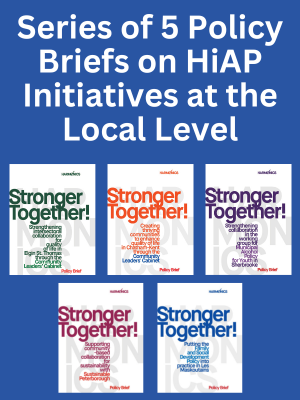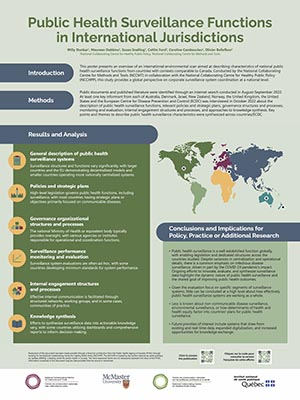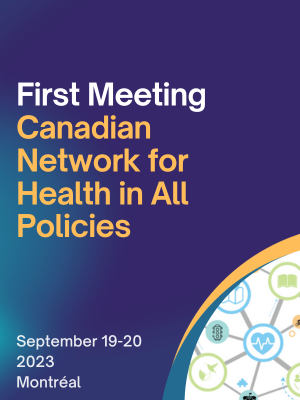What’s new?

Stronger Together! Five Policy Briefs about Strengthening Implementation of Health in All Policies (HiAP) at the Local Level in Ontario and Québec
The HARMONICS research team has partnered with the NCCHPP to produce five policy briefs that feature a series of recommendations for implementing Health in All Policies at the local level.

Symposium – What Can Public Health Organizations Do to Improve Their Capacities to Act on Healthy Public Policies?
The NCCHPP offered a symposium entitled: What Can Public Health Organizations Do to Improve Their Capacities to Act on Healthy Public Policies? on April 25 at the Public Health 2024 Conference in Halifax.

Poster – Public Health Surveillance Functions in International Jurisdictions
This poster presents an overview of an international environmental scan aimed at describing characteristics of national public health surveillance functions from countries with contexts comparable to Canada. This study equips public health professionals with insights to better identify and understand the dynamics of public health surveillance systems across international contexts, akin to Canada’s. It sheds light on the imperative of infectious disease surveillance, especially highlighted by the COVID-19 pandemic, while also pointing towards future challenges and opportunities such as real-time data utilization, digitalization, and enhanced knowledge sharing. Through this, it supports efforts to refine surveillance strategies, innovate with data integration, and foster informed decision-making for improved public health outcomes.

Conference Lalonde@50: How Can We Move the Needle on Equitable Health Promotion?
Save the date! Join us on May 14-15, 2024 for the conference marking the 50th anniversary of the publication of ”A New Perspective on the Health of Canadians”, this conference will examine the history and legacy of Marc Lalonde’s ground-breaking report to shed light on the future of population and public health and health equity. The NCCHPP is proud to be a partner in this event.

The NCCHPP was a partner of the ESPUM’s 1st Symposium on Indigenous Health
The Université de Montréal School of Public Health (École de santé publique de l’Université de Montréal – ESPUM) held its 1st Symposium on Aboriginal Public Health on March 19, 2024.

The NCCHPP will be in Halifax at the Public Health 2024 Conference, April 23-25
The NCCHPP will be in Halifax at the Public Health 2024 Conference, from April 23 to 25, 2024. Click to learn more about the various activities that we will be hosting, or partnering with, at the conference.

Presentation – Collaborating with Elected Representatives in Small Québec Municipalities
This presentation was organized by the Québec Public Health Knowledge Translation Community of Practice (Communauté de pratique sur le transfert des connaissances en santé publique du Québec) for their members. It foregrounded the expertise of Madeleine Lefebvre, a municipal councillor and researcher at the Université du Québec en Abitibi-Témiscamingue and of Florence Morestin, Scientific Advisor at the NCCHPP. This presentation was held on February 21, 2024.

International environmental scan of public health surveillance functions
This environmental scan aims to describe characteristics of national public health surveillance functions from countries with comparable contexts to Canada to provide a global perspective on corporate surveillance system coordination functions at a national level.

First Meeting of the Canadian Network for Health in All Policies (CNHiAP)
Have a look at the Powerpoint presentations from the first meeting of the Canadian Network for Health in All Policies (CNHiAP). This meeting was held on September 19-20, 2023, in Montréal.


